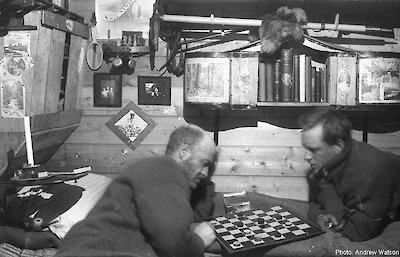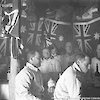Building the team
In their own words
The thing that struck me most … was the obvious affection the other seven had for Frank Wild, the leader. It was more than affection, it was almost worship … from what the others told us, his leadership was inspired. Not a conspicuous figure at any time, yet there was something in his presence which inspired confidence … This was his third trip to the Antarctic, and he had fully absorbed the lessons on previous expeditions … his quiet cheerfulness, forethought and kindly consideration for those with him never slackened for a moment. He was, in truth, an ideal man for the job.
— Charles Laseron in South with Mawson
The isolation of the Western Party combined with its small size put a heavy responsibility on each member to put aside the inevitable differences and ‘get on’ with his companions. No-one felt the responsibility more keenly than Frank Wild.
His main concern — rightly — was to ensure his men remained in good spirits. To this end he maintained a routine that balanced work and leisure, allowing regular hours for recreation. When the weather allowed he ensured everyone had the opportunity to enjoy the outdoors — a ball game or a sledge trip were the most common pursuits.
Indoors every excuse was made for a feast. Someone’s birthday or the odd anniversary was seized upon and turned into an occasion (see the menu for Kennedy’s birthday dinner [PDF]). Midwinter in June 1912 demanded a special effort, as Harrisson recorded:
Table removed to far end of room for flashlight photo. Table covered with white cloth — for the first time. Bunks behind and centre posts draped with flags. Excellent dinner. Soup cheese canapes, roast sirloin of seal baked with dripping over it, beautifully tender and really very nice. Potatoes, peas, turnips, plum pudding with whiskey sauce. Raspberries and strawberries in jelly. Raisins almonds, figs, cheese straws etc.
See Dovers' diary entry describing Midwinter Day, skiing, an oven explosion and a day trip from the hut [PDF].
The Western Party had two advantages over the men of Cape Denison. Lying 30 kilometres north of the Antarctic Circle they enjoyed sunshine even in the depths of winter, whereas their colleagues to the east (about 50 kilometres south of the circle) had to endure some weeks without it. And while blizzards kept them confined for long periods, there was a ‘moderate percentage’ of bright, sunny days.
The affection of the Western Party for their leader, observed by Charles Laseron in the return voyage of 1912, was reciprocated. Said Wild in The Home of the Blizzard:
I should like to pay a tribute to the good-fellowship, unfailing industry, enthusiasm and unswerving loyalty which characterized my comrades. During the whole of the Expedition, whether carrying out monotonous routine work at the Base or under the trying conditions of sledging, all duties were performed with never-failing good temper and perseverance. Should it ever be my lot to venture on a like expedition I hope to have some, if not all, of the same party with me. But whether we meet again or not, I shall always think of every man of them with the greatest affection and respect.


